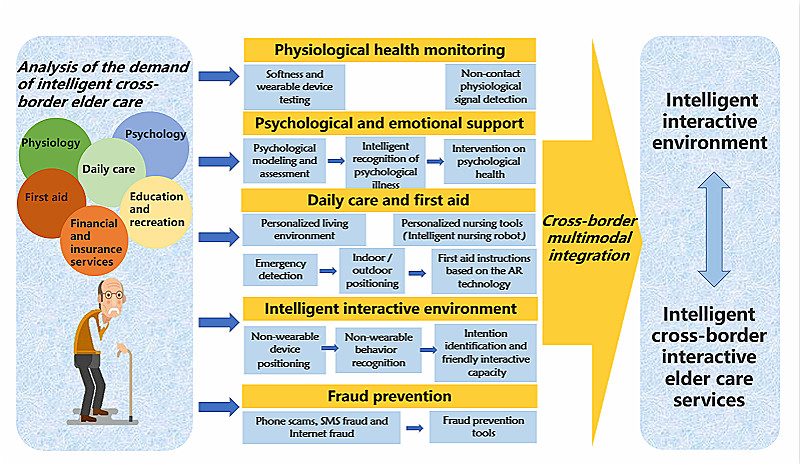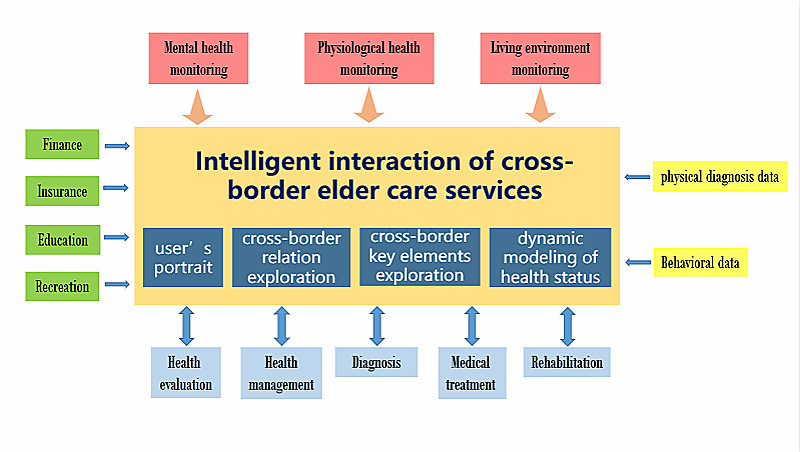Nowadays elder care has become one of the hot social issues. According to scientists, intelligent elder care will reach everywhere to improve the life quality of the elderly in the future. Just like shopping on Taobao (A Chinese e-commerce platform), the elderly will be able to acquire the service they need on the Internet and post reviews on the website. Their physical and psychological health can be monitored via wearable devices whenever and wherever possible. Also, the medical data from different hospitals can be interconnected.
Intelligent elder care is the research focus of the “Application Demonstration of Cross-border Services for Healthy Elder Care”, a project supported by the National Key Research and Development Program. This project is carried out by the College of Intelligence and Computing, Tianjin University.
Existing elder care resources are insufficient to satisfy the growing demands of an aging population, due to the declining birth rate and increasing life expectancy in China. Moreover, the current elder care suffers from poor standards and low quality. In response to these problems, three “Healthy Elder Care +” platforms — platforms of cross-border service integration, credit evaluation and data analysis have been included to support Intelligent Elder Care. Also, Intelligent Elder Care will take into consideration the multimodal elder care ranging from housing and community to sojourning elder care and the integration of resources in insurance, payment, education, recreation, and information services.
Integration of Data and Cross-border Services
Different medical insurance policies, hospital registration systems and medical apparatus may be inconvenient for the elderly. “One of the goals of the Project is to explore a new model of elder care.” said Associate Professor Chen Shizhan, one of the team members of the Project. He added that the cross-border service system for elder care is a complex social network system covering medical treatment, nursing, daily life, finance, and psychological services, among many others.
The research mainly studies the new model of cross-border integration for elder care, the evaluation mechanism of service quality and credit, and the establishment of credit management platform. It will also provide methodical guidance for the coordination, interoperation, and integration of the social network system by working out standards and technical measures.

Comprehensively Monitoring Twilight Years through "Human-machine-object-environment" Interaction
According to the Project, big data application platform of cross-border services for elder care will also be developed in the analysis of the elderly’s practical demands, so that they would be able to know their own health condition well. For example, they can get the hang of how chronic diseases like cardia-cerebrovascular disease and osteoarthritis develop in their body and devise a healthy diet accordingly. In addition, wearable devices, nursing beds, wheelchairs and fraud prevention system for the elderly will also be developed, thus providing a comprehensive assistance.
The “Migrant Bird Pattern” of elder care, which refers to sojourning according to the variation of seasons has become very popular in recent years. The Project will provide solutions for featured business platforms and build an innovation demonstration base for sojourning elders with functions of information management, health monitoring, and mobile services.

Beijing, Tianjin and Other Regions will be the Pilot Zones
"Similar to e-commerce platforms like Taobao and Jingdong, this platform will access third-party organizations to provide personalized services. The elderly can search for services or products online and publish their reviews.” said Chen. He added that in the future, medical insurance and social insurance will be reached via a single intelligent card.
This cross-border integration service model with home-based care being the primary measure, and community-based and sojourn-based care being the supplementary ones will be trialed to users in Beijing, Tianjin, Shandong, Zhejiang, Yunnan and other regions initially, and will benefit more than 15 million users in the future.
By: Liu Xinning, Wu Jingjing
Editors: Sun Xiaofang and Keith Harrington






